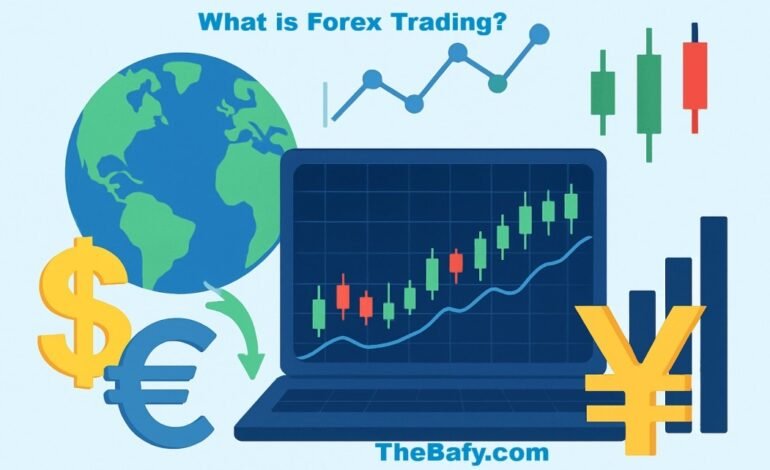
What Is Forex Trading? A Beginner’s Guide
Foreign Exchange (Forex) trading is the process of buying and selling currencies to make a profit. The foreign exchange (Forex) market is the largest financial market in the world, with a daily trading volume exceeding $7.5 trillion as of 2025. Unlike stock markets, which operate on fixed exchanges, the Forex market is an over-the-counter (OTC) market that is open 24 hours a day, five days a week.
Foreign Exchange (Forex) trading involves trading currency pairs, such as EUR/USD (Euro/US Dollar), GBP/JPY (British Pound/Japanese Yen), and many others. Buying one currency while simultaneously selling another currency.
Why Is Forex Trading Popular?
Low Capital Needed: You can begin trading with just $100.
High Liquidity: The large volume makes it simple to enter and exit trades.
Options for Leverage: Trade more than your actual capital.
Accessibility: all you need is an internet-connected device.
24-Hour Market: Trade from Monday through Friday at any time.
These features make Forex ideal for those looking to #MakeMoneyOnline, build #PassiveIncome, and explore #OnlineIncome opportunities.
How Does Forex Trading Work?
In foreign exchange (forex) trading, currencies are always traded in pairs, such as EUR/USD. The first currency is the base currency on the left side of the EUR, and the second is the quote currency on the right side, USD. For example, in EUR/USD:
EUR is the base currency.
USD is the quote currency.
If the EUR/USD rate is 1.2000, it means 1 Euro = 1.20 US Dollars. If you think the euro will strengthen against the dollar, you would buy the pair. If you think it will weaken, you would sell it.
Prices fluctuate such as based on economic indicators, political events, central bank policies, and market sentiment.
Key Terms Every Beginner Should Know
Pip: The smallest change in the price of a currency pair is called a pip.
Spread: The variation between the asking (buy) and bid (sell) prices.
Leverage: This enables you to manage a sizable investment with a modest sum of money.
Margin: The sum of funds needed to initiate a trade that is leveraged.
Lot Size: The amount of money involved in a transaction; typically, this is 100,000 units.
These basic forms are the backbone of #Forex101 and help to understand the #ForexBasics in the foreign exchange market.
Easy Steps to Start Forex Trading
Choose a Reliable Forex Broker: Choose a regulated broker with low fees, a demo account, and a user-friendly trading platform.
Open a Trading Account: Opening a trading account with a forex broker requires submitting the required documents for verification and then transferring the funds to the trading account.
Learn with a Demo Account: Practice forex trading with virtual money until you get familiar with market dynamics.
Create a Trading Plan: Decide how much risk you’re willing to take, your target profit, and what currency pairs you’ll focus on.
Start Trading with Real Money: Start with a small investment. Analyze the market, place your trades, and keep a trading journal.
Common Forex Trading Strategies for Beginners
Day trading: Buying and selling the currency pair in forex trading within the same day.
Swing Trading: Hold positions for several days to capture the trends for the particular forex currency pair.
Scalping: execute multiple trades with small profit lots per day.
Position Trading: Holding the positions for long-term trades based on fundamental analysis.
Every strategy requires different skills and suits different personality types. Knowing which style fits you to help you #InvestSmart and avoid unnecessary losses.
Risks in Forex Trading
Forex entails the same dangers as other investments:
Market volatility may result in abrupt price swings.
High leverage may magnify gains and losses.
Novices can easily lose money due to ignorance.
For this reason, before you begin, #ForexEducation and #TradingTips are essential. Remember that it’s a skill, not gambling.
Tips for Success in Forex
Never take on more risk than you can bear to lose.
To control risk, use stop-loss orders.
Keep abreast of economic developments.
To monitor what works, keep a trading journal.
Keep learning using blogs, demo accounts, and classes.
Forex can help you reach your financial objectives and develop #FinancialFreedom if you are patient and disciplined.
Is Forex Right for You?
Forex trading isn’t a get-rich-quick scheme. It requires patience, strategy, and a deep understanding of the market. However, for those who invest the time and effort, it can be a rewarding way to grow their wealth, learn valuable financial skills, and achieve #PassiveIncome acquire valuable financial skills, and achieve passive income
Explore more beginner-friendly guides, expert tips, and strategy breakdowns at TheBafy.com, which is your hub for #FinancialEducation and smart investing insights.
